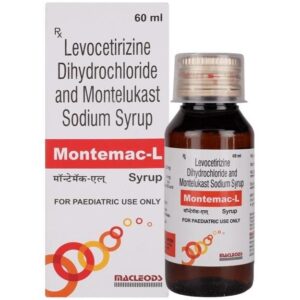LEVOCETRIZINE + MONTEKIUKAST
Levocetrizine: Levocetirizine is a medication that belongs to a class of drugs known as antihistamines. It is mainly used to provide relief from symptoms associated with allergic conditions such as hay fever, hives, and allergic rhinitis.
The drug works by blocking the effects of histamine, a chemical produced by the body as part of the allergic response. Histamine is responsible for causing the various symptoms of allergies, including itching, sneezing, runny nose, and watery eyes. By blocking the histamine receptors, levocetirizine helps to alleviate these symptoms.
The usual recommended dose of levocetirizine for adults and children over 12 years old is 5 mg (one tablet) once daily. For children between 6 to 12 years old, the recommended dose is 2.5 mg (half a tablet) once daily. Levocetirizine can be taken with or without food, and it is essential to follow the instructions of the prescribing doctor or the information on the medication label.
As with any medication, levocetirizine does have potential side effects. The most commonly reported side effects include drowsiness, headache, dry mouth, and fatigue. These side effects are usually mild and may improve with regular use. However, if they persist or worsen, it is advisable to consult a healthcare professional.
In rare cases, levocetirizine may cause more serious side effects such as allergic reactions (rash, itching, swelling), difficulty breathing, or severe dizziness. If any of these symptoms occur, medical attention should be sought immediately.
It is important to note that levocetirizine may interact with other medications, so it is crucial to inform your doctor or pharmacist about any other drugs you may be taking. Levocetirizine should also be used with caution in individuals with pre-existing medical conditions such as kidney disease or liver problems.
In summary, levocetirizine is an antihistamine drug commonly used to relieve symptoms of allergies. It blocks the effects of histamine to alleviate itching, sneezing, runny nose, and watery eyes. The recommended dose varies depending on age, and common side effects include drowsiness, headache, dry mouth, and fatigue. It is important to seek medical attention if any severe side effects occur or if there are any questions or concerns about its use.
Montekiukast: Montelukast is a medication used to treat asthma and exercise-induced bronchoconstriction. It belongs to a class of drugs known as leukotriene receptor antagonists.
The main mechanism of action of montelukast is by blocking the action of leukotrienes, which are substances involved in the inflammatory process in the lungs. By doing so, it helps to prevent the narrowing of airways, reduce inflammation, and improve breathing in individuals with asthma.
The recommended dosage of montelukast can vary depending on the age and condition being treated. For adults and adolescents aged 15 years and older, the usual dose is 10 mg taken orally once daily in the evening. For children aged 6 to 14 years, the recommended dose is 5 mg once daily in the evening. For younger children between 2 to 5 years, the dose is generally 4 mg given once daily in the evening.
Common side effects of montelukast may include headache, gastrointestinal disturbances like stomach pain or diarrhea, fever, cough, and sore throat. While these side effects are typically mild and temporary, there have been rare reports of more serious effects like behavioral and mood changes, including suicidal thoughts. If any concerning side effects occur, it is important to consult a healthcare professional.
Montelukast is not recommended for the treatment of acute asthma attacks and should not be used as a rescue medication. It is important to continue taking other asthma medications as prescribed by the healthcare provider. It is always advised to consult a doctor or pharmacist for more specific information regarding the use of montelukast, as individual circumstances may vary.

